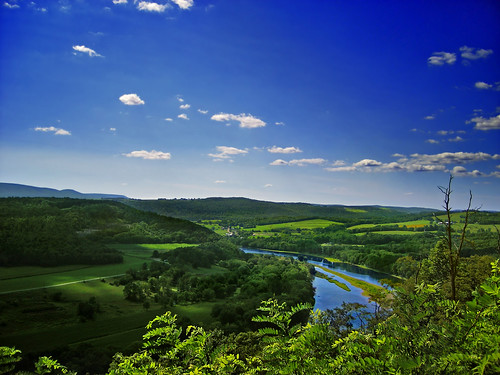Marcellus Shale: Suffering from Solastalgia

Image by nicholas_t
“You told me about the winners of the Marcellus drilling. What about the losers?” My friend asked this after scanning an article in the Daily Review about a public hearing on fracing fluid.
I finished the last bite of my Krispy Kreme before answering. “Well, you know, I’m writing a story about the losers, but I can’t seem to concentrate. Every time I start writing, I get stressed and depressed. I think I’m suffering from …”
In 2002, Glenn Albrecht, an Australian philosopher visited the Upper Hunter Valley of southeastern Australia, observing the impacts of two decades of open-pit coal mining on the residents. The area, once peaceful, lush farmland, was now enduring blasts from chemical explosives several times a day. Gray dust from the blasts covered homes, crops, and animals for miles around. With high-output lights glaring non-stop, dark night skies were only a distant memory. Trucks, draglines, and idling coal trains provided an unending low-frequency rumble. Rivers and streams were polluted, and the residents of the Upper Hunter were distraught.
In a recent interview with Daniel B. Smith in the New York Times Magazine, Albrecht discussed his observations of the Upper Hunter. (Is There an Ecological Unconscious?). Excerpts from the article:
“People have heart’s ease when they’re on their own country. If you force them off that country, if you take them away from their land, they feel the loss of heart’s ease as a kind of vertigo, a disintegration of their whole life.” Australian aborigines, Navajos and any number of indigenous peoples have reported this sense of mournful disorientation after being displaced from their land. What Albrecht realized during his trip to the Upper Valley was that this “place pathology,” wasn’t limited to natives. Albrecht’s petitioners were anxious, unsettled, despairing, depressed — just as if they had been forcibly removed from the valley. Only they hadn’t; the valley changed around them.
In Albrecht’s view, the residents of the Upper Hunter were suffering not just from the strain of living in difficult conditions but also from something more fundamental: a hitherto unrecognized psychological condition. In a 2004 essay, he coined a term to describe it: “solastalgia,” which he defined as “the pain experienced when there is recognition that the place where one resides and that one loves is under immediate assault . . . a form of homesickness one gets when one is still at ‘home.’”
So, perhaps I’m suffering from a kind of pre-solastalgia; prematurely anxious about the growing and apparently unstoppable Marcellus assault on rural northeastern Pennsylvania. Heavy trucks already rumble day and night, drilling pads multiply weekly, and pipelines slowly snake their way across more and more miles of farm land. Worrisome news of DEP and DOT violations by gas-related companies foreshadow future assaults on our air, water, and land.
Loss of heart’s ease … Homesickness one gets when one is still at home … Will Home always Beckon?